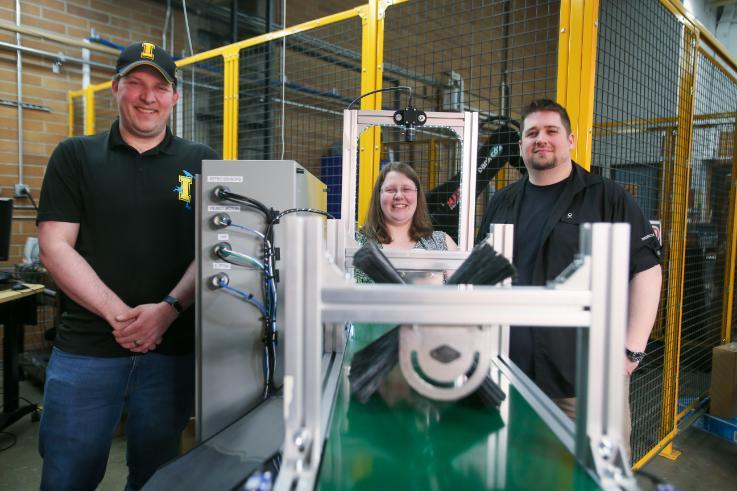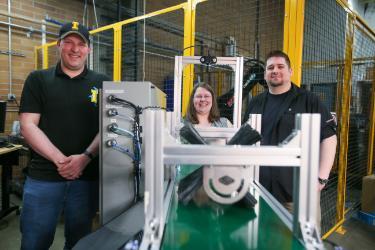Project S.P.L.I.N.T.E.R.
Posted: Wednesday, Oct 2, 2024

Three University of Idaho Coeur d’Alene/North Idaho College students have designed an automated machine that will annually save a local company $300,000.
James Lasso, Jordan Reed and Dan Blanchette all started their education in NIC’s computer science program before transferring to U of I Coeur d’Alene’s computer science undergraduate program in a 2+2 partnership between the schools. Their College of Engineering capstone design is called Project S.P.L.I.N.T.E.R. — Smart Plank Inspection for Navigation for Timber Evaluation and Recognition.
“The idea of the project is there’s this company that makes salmon grilling planks and they have a team of graders that stand around and look at the planks to make sure there’s no defects,” team lead James Lasso said. “They look for knots, rot, cracks and metal, just everything.”
The cedar grilling planks produced at Wildwood Grilling in Ponderay are used for making delicious dishes such as planked pork chops, maple-planked chicken adobo tacos, artichoke spinach stuffed chicken and more.
Because these planks are used in cooking, they must be pristinely crafted to adhere to the highest food safety standards.
“It’s a slow process, it’s tedious, it’s hard,” Lasso said, “so we were tasked with building a system to alleviate that and increase production speed.”
The team built an automated machine that inspects the planks and identifies any flaws. If any are found, the rejected planks are swept from the conveyor belt while the accepted planks are sent through.
“It’s going to take a picture, it’s going to run it through the model to see if it’s a bad board or not,” Reed said. “If it is and if our model has detected it, it will come through and it will kick it off.”
Software the team designed keeps track of the process, and the team chose all the parts for the construction of the machine.
“The idea is we’re using machine vision to take pictures of the planks to identify defects and alleviate that process and see if we can speed it up,” Lasso said
Dr. John Shovic, director of U of I’s Center for Intelligent Industrial Robotics, serves as the team’s adviser and mentor. He brought the project to them after visiting Wildwood to see what real-world applications the students could address for their two-semester capstone project.
“They showed us four projects they were interested in us doing, but then they said, ‘This is the one we would really like you to do,’” Shovic said. “It has some AI, some robotics, some industrial automation. I said, ‘We can do that.’”
Once implemented, Project S.P.L.I.N.T.E.R. will save Wildwood $300,000 a year, Shovic said.
The students demonstrated the machine at the Engineering Design EXPO on the University of Idaho campus in Moscow April 25-26. Shovic said Wildwood representatives attended and got to see Project S.P.L.I.N.T.E.R. in action.
“They had seen pictures, but seeing the reality of the machine working, they’re just very, very pleased,” he said.
Lasso, Blanchette and Reed are non-traditional students all on course to graduate with their bachelor’s degrees soon.
Lasso was in the workforce for many years before starting a family, which motivated him to go back to school. He is dual-enrolled at NIC through the consortium agreement it has with U of I and its academic center in Coeur d’Alene.
“I transferred early because I finished all my computer science courses early in the program, so I’ve been doing both at the same time,” he said. “I’ll get my associate and my bachelor’s at the same time.”
Reed is a 2011 graduate of Priest River Lamanna High School who went to U of I in Moscow to major in mathematics for a few years, but left to join the workforce before completing her program.
“Through a lot of retail work I decided, ‘No, this is not what I want to do, I want to go back and at least get a degree,’” she said.
She had transferred all of her credits to NIC to obtain an associate degree.
“I ended up taking a computer science class and it clicked,” she said. “It was, ‘Oh, this is for me.’”
Blanchette, a 2004 Coeur d’Alene High School graduate, is presently a computer science undergraduate through the University of Idaho Coeur d’Alene.
“I will be pursuing a graduate degree and that is going to have a focus in industrial automation,” he said.
Lasso said it has been a smooth process working toward his future at NIC and U of I Coeur d’Alene.
“The transition to the U of I was really easy. They were super welcoming, it was easy to transfer,” he said. “It’s been great. And I can stay here to complete the computer science program, that helped a lot.”
Reed said the nice thing about NIC and U of I Coeur d’Alene is that they’re more than willing to work with non-traditional students.
“I had my son in the middle of the semester, but the professor, he was from U of I teaching NIC classes, and he was willing to work around that,” Reed said.
Blanchette said he really appreciates the on-campus resources both institutions offer.
“That helped pave the way for me with some of the stuff I ended up doing later,” he said.
Blanchette said he has been appreciative of his capstone experience because of his plans to go into industrial automation.
“The part of the project that was my module gave me a lot of experience getting to see what that’s like and wiring up this entire (programmable logic controller) and everything else,” he said. “Troubleshooting it with help from a (U of I Coeur d’Alene) grad student, Hunter Hawkins, helped build my base knowledge on how these things work and what to expect.”
Shovic said he gave the team minimal technical direction.
“This was their project, their design,” he said. “I pointed in the right direction and they ran.”
He said Lasso, Blanchette and Reed have been exceptional workers on this project, on which they will continue to work and refine as they pursue graduate degrees at U of I Coeur d’Alene.
“I’ve never had a better group of senior design students, ever. I knew they were good from the beginning,” Shovic said. They’re my dream team. I couldn’t be more pleased with them.”
“Each and every one of them deserves a lot of credit,” he said. “I intend to get each one of them a doctorate. They're definitely capable.
Shovic also praised the collaboration between U of I, its Coeur d’Alene center and NIC that makes these projects possible.
“The partnership between U of I and NIC is exceptional,” he said.
Return to Newsroom